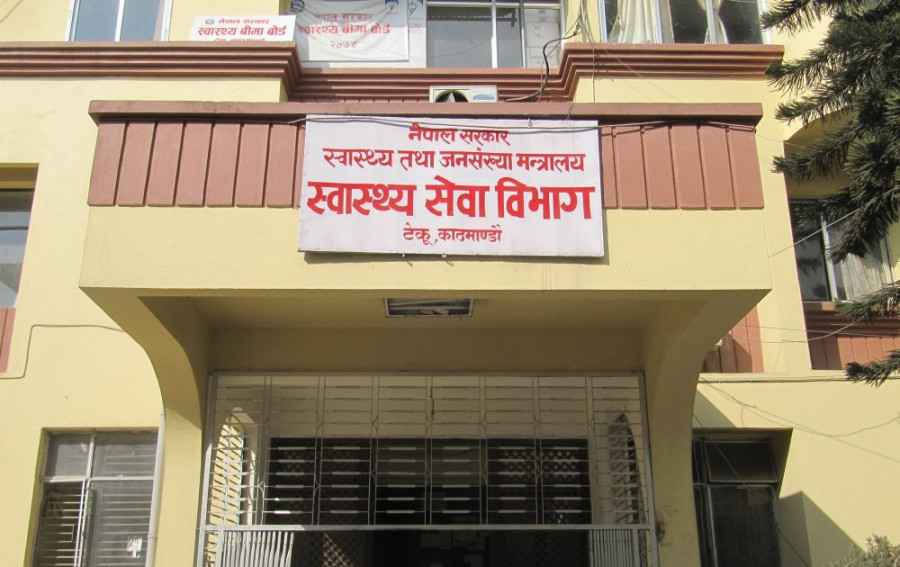Health
Budget cap threatens years of Nepal’s healthcare gains, officials warn
Cuts may jeopardise major programmes on maternal and child health, immunisation, nutrition, HIV, TB, mental health, and epidemic control, among others.
Post Report
No new healthcare programmes will be launched in the upcoming fiscal year, and the risk of unravelling achievements made through years of investment is too high. This was the warning to officials at the Ministry of Finance by officials from various agencies under the Department of Health Services.
A few days ago, officials from various divisions under the department met finance ministry officials to draw attention to the shrinking budget ceiling and mounting liabilities. They urged the ministry to consider the consequences of budget cuts on public health programmes, including maternal health, child health, immunisation, nutrition and others, which are among the country’s top priorities.
“But they asked us to discuss with the leadership of the Ministry of Health and Population instead and prioritise the budget accordingly within the ceiling set for the ministry,” said Dr Bibek Kumar Lal, director at the Family Welfare Division. “We are not in a position to launch any new healthcare programmes and are worried about setbacks to the achievements made so far through years of investments.”
For the next fiscal year 2025-26, the Ministry of Finance has set an expenditure ceiling of Rs83 billion for the Ministry of Health and Population. This amount is Rs3 billion less than the allocation for the current fiscal year.
The government presents the annual budget in Parliament on Jestha 15 every year according to Nepali calendar. It will be May 29 this year.
The Health Ministry has accordingly slashed the budgets of concerned departments. Lal told the Post that the budget ceiling for the division for the next fiscal year has been reduced by Rs520 million compared to the current fiscal year, which will affect most programmes.
Likewise, officials at the National Centre for AIDS and STD Control said that their budget ceiling has been reduced by Rs55 million, which is too low to continue even basic services, including antiretroviral treatment and HIV testing programmes. Other divisions and sections also raised concerns over the budget cut and warned of disruption in programmes that Nepal has committed to at the international level.
According to them, the government’s budget cut could affect major priority health programmes, including those related to maternal and child health, immunisation, nutrition, HIV, tuberculosis, epidemic control, non-communicable diseases, including mental health, among others.
“We will not introduce any new programmes in the upcoming fiscal year,” said Dr Tanka Prasad Barakoti, director general at the Department of Health Services. “We have urged officials to understand the consequences of budget cuts on the crucial public health programmes. We hope our concern will be addressed in the new budget.”
A new recent report by the World Health Organisation shows that Nepal has reduced maternal deaths by over 70 percent since 2000. The UN health body, in its report stated that currently 142 Nepali women currently die from maternity-related complications per 100,0000 live births.
A previous study carried out by the National Statistics Office in 2021 had shown 151 maternal deaths per 100,000 live births.
Similarly, neonatal mortality now stands at 16.6 per 1,000 live births, and the stillbirth rate has decreased to 13.5 per 1,000 births, according to the UN health body.
The Nepal Demographic and Health Survey-2022, carried out by the Ministry of Health and Population, showed that 21 neonates die per 1,000 live births.
“To close this gap and to ensure Nepal continues to stay on track to meet the Sustainable Development Goals (SDGs) target on MMR, we must prioritise women’s and newborns’ health and well-being and invest accordingly,” Dr Rajesh Sambhajirao Pandav, WHO representative to Nepal, stated in the report.
The WHO has emphasised that urgent investment is needed to prevent maternal deaths.
Public health experts warn of setbacks in the achievements made over the years in Nepal’s public health sector due to budget cuts by the government and the suspension of multiple public health programmes by USAID, the principal donor of healthcare programs.
Several ongoing healthcare programmes have already been affected after the US government suspended nearly all foreign assistance worldwide for three months in the last week of January, soon after Donald Trump assumed presidency.




 17.7°C Kathmandu
17.7°C Kathmandu












.jpg&w=300&height=200)

